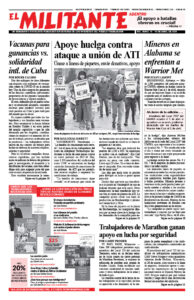There are two different class approaches to the vaccination efforts against COVID-19 confronting workers and farmers around the world today. One ensures the profits of the ruling capitalist families, who own the giant for-profit pharmaceutical and medical insurance monopolies.
The other, championed by the Cuban people and their socialist revolution, concentrates social resources to develop vaccines for every single person in Cuba and for every country in the world that wants it.
It’s essential that all workers and their families get vaccinated. In order to rebuild the workforce in the U.S. and elsewhere in the capitalist world — which has been decimated by layoffs, job combinations and speedup, accelerated by the pandemic — workers need to band together in our workplaces to fight in defense of our jobs, wages and safety.
But the cut-throat competition for market share by mammoth profit-driven capitalist pharmaceutical companies, which have received billions of dollars in government largesse for vaccine research, development and distribution, is tearing this kind of world outlook to shreds.
This medicine-for-profit approach, alongside the capitalist rulers’ me-first, the rest-be-damned protectionism, will leave billions in underdeveloped countries without the possibility of vaccination for months to come, if at all. Prolonging the length of the pandemic will further devastate the livelihood of millions, and raise the potential of viral mutations that can sweep across the globe.
Under this pressure, the temptation for pharma bosses to fudge their test results to get to market more quickly is huge.
On March 1, almost three months after the wealthiest capitalist countries like the U.S. bought up the most promising vaccines and started their inoculation campaigns, the governments of Ghana and Ivory Coast had each received about 500,000 doses from Covax, a program run by the World Health Organization. This is barely enough to begin inoculating health care workers and the elderly.
Most of the 142 countries enrolled in Covax are in a similar situation. The Guardian reported in January that Africa, with a population of 1.3 billion, will receive only 140 million doses by June, at best.
And the Covax program is unraveling as pharma giants prioritize deals with the highest bidders.
As of mid-January, more than 7 billion vaccine doses had been purchased globally, with 4.2 billion going to major capitalist countries, the Guardianreports. Some of these governments have purchased enough doses to cover their populations several times over. The Biden administration is sitting on tens of millions of doses of the AstraZeneca vaccine, waiting to be approved for use. In the meantime, it says it’s considering “lending” Mexico some.
‘Vaccine protectionism’
Tensions are high even among competing imperialist powers. In early March, the European Commission blocked exports of AstraZeneca vaccines produced within the EU bloc to countries with “better vaccination coverage.” It complained the manufacturer wasn’t meeting production targets, affecting the vaccine rollout in member nations. EU representatives have attacked AstraZeneca for using factories located in Europe to make doses destined for the United Kingdom, demanding this be stopped.
The German government is seeking to accumulate a mass of vaccines to hoard. Meanwhile, the Indian government was scolded after announcing March 26 that its Serum Institute, the world’s largest vaccine manufacturer, would temporarily “adjust” down exports to give priority to its own immunization campaign.
The truth is the scarcity of vaccines is created by the workings of capitalism. Rather than mobilize all the resources of society, vaccine creation and production is left to the “market” and its “profit motive.” The winners hope to make trillions. Working people are the losers.
Cuba: ‘We share what we have’
Cuban people greeted with excitement and pride the progression of late-stage trials of two of the five vaccines being developed there — Soberana 2 and Abdala — which put Cuba well underway to becoming the first Latin American country to make its own vaccine.
After positive initial test results, a much larger Soberana inoculation study was launched in late March. It will vaccinate 1.7 million people — most of the adult population of Havana — by the end of May. A second effort was initiated in the eastern provinces using Abdala shots. The goal is to inoculate 70% of the country’s population by August, the rest by the end of the year, Dr. Ileana Morales Suárez of Cuba’s Ministry of Health reported on Cuban television.
Cuba’s medical and scientific achievements are possible because working people made a revolution in January 1959 and took power out of the hands of the capitalist rulers and their U.S. imperialist backers.
In 1962 the revolutionary government of Cuba began a countrywide National Immunization Program, on the heels of a completely successful mobilization that vaccinated every Cuban under 15 against polio in one week.
The new program, Miguel Galindo, its director, explained in 1999, relies on four basic principles.
• Vaccination efforts encompass the entire Cuban people.
• Vaccination is integrated into primary health care services.
• The program relies on active community participation.
• Vaccination is free of charge.
Cuba’s goal is not only to provide inoculation against COVID-19 to its population, and to anyone who visits Cuba, but also to make it available around the world. Cuba’s revolutionary government is organizing to provide free vaccines to the most exploited nations and at a sliding scale to others.
Like other internationalist aid Cuba has provided around the world, the vaccine development is done under the revolution’s principle, “We don’t give what we have left over. We share what we have.”
We’re demonstrating here in Cuba that “this vaccine is effective and that we can help fight the epidemic in the entire world,” José Luis Saldívar told Cuban television as he volunteered for the Abdala clinical trial in Guantánamo province.
Parallel clinical trials of the Soberana 2 are underway in Venezuela and Iran, and other countries have expressed interest in getting the vaccine as well. Iranian health officials say that millions of doses could be produced under an agreement with Cuba that allows technology transfer and joint production.

